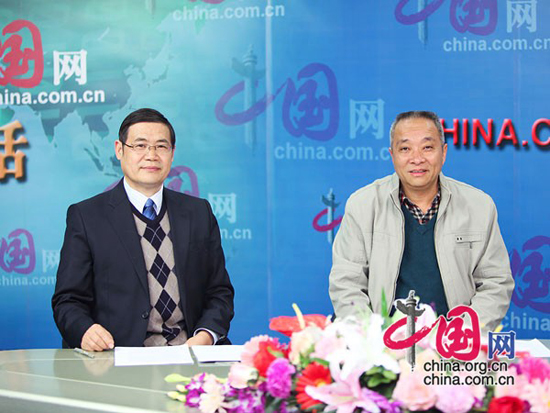Experts interpret 'decisive role' of market
- By Zhang Lulu
 0 Comment(s)
0 Comment(s) Print
Print E-mail China.org.cn, November 14, 2013
E-mail China.org.cn, November 14, 2013
The Communist Party of China (CPC) has acknowledged the market's "decisive role" in resource allocation, according to the communiqué issued after the four-day Third Plenary Session of the 18th CPC Central Committee closing Tuesday.
The public has been discussing what "decisive" means to the Chinese economy and what impact it will have on the relation between the government and the market. China.org.cn invited Pan Jiahua, director of the Institute for Urban and Environmental Studies, Chinese Academy of Social Sciences, and Wang Guogang, director of the Institute of Finance and Banking, Chinese Academy of Social Sciences, to talk about these issues on Nov. 12.
|
China.org.cn invited Pan Jiahua (L), director of the Institute for Urban and Environmental Studies, Chinese Academy of Social Sciences, and Wang Guogang (R), director of the Institute of Finance and Banking, Chinese Academy of Social Sciences, to talk about the "decisive role" of the market outlined in the communiqué released by the Third Plenary Session of the 18th CPC Central Committee on Nov. 12. [Photo/ China.org.cn] |
Wang explained the gap between China's current economic system and a mature market economy.
Administrative mechanisms have intervened in the Chinese economy, which means the prices of goods and the allocation of resources are determined by this mechanism rather than the market. China has had over-capacity since 1998, much of which has been brought about by the administrative mechanism.
Secondly, there are too many things under government control which should have been decided by the market. "The long-standing approval system is a typical example. Recently Guangdong Province underwent a new series of reforms to shorten the period of approval to a dozen days, which is significant progress." Wang explained.
Thirdly, as the decisive role of the market has not been exploited, there have always been problems with the allocation of resources. Therefore, institutional reform is imperative to promote economic development. Wang added. Pan argued that the current market is still based on unequal exchanges. For instance, farmers' land is requisitioned to help develop urban areas, while the farmers themselves do not enjoy equal opportunities when seeking jobs or an education for their children in the cities. It is essential to protect the equal exchange of resources and develop the socialist market economy.
Furthermore, China's price mechanism is still in the control of the government. If the elements of resources cannot reflect the relation between the supply and demand, then prices will not be rational. The core of the market should be an equilibrium between supply and demand, but China's price mechanism is far from perfect.
"Local governments under the current system act both as players and referees, whereas in fact they should not participate directly in the operation of the market, but instead stick to supervising the market." Pan said.






